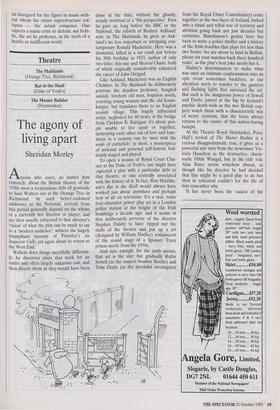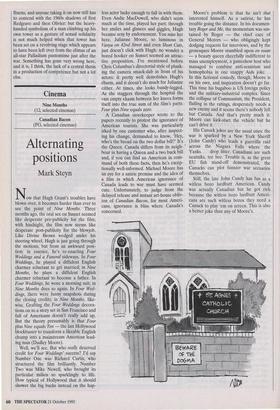Theatre
The Maitlands (Orange Tree, Richmond) Rat in the Skull (Duke of York's) The Master Builder (Haymarket)
The agony of living apart
Sheridan Morley
Anyone who cares, no matter how remotely, about the British theatre of the 1930s owes a tremendous debt of gratitude to Sam Walters out at the Orange Tree in Richmond. At such better-endowed addresses as the National, revivals from this period generally depend on the whims of a currently hot director or player, and are then usually subjected to that director's `vision' of what the play can be made to say to a 'modern audience'; witness the hugely triumphant travesty of Priestley's An Inspector Calls, yet again about to return to the West End.
Walters does things mercifully different- ly: he discovers plays that work for an entire and often largely unknown cast, and then directs them as they would have been done at the time, without the ghastly, trendy overload of a '90s perspective'. First he gave us, long before the BBC or the National, the rebirth of Rodney Ackland: now, in The Maitlands, he gives us Ack- land's no less important or intriguing con- temporary Ronald Mackenzie. Here was a dramatist, killed in a car crash just before his 30th birthday in 1933, author of only two titles: this one and Musical Chairs, both of which originally considerably enhanced the career of John Gielgud.
Like Ackland, Mackenzie was an English Chekhov. In The Maitlands he deliberately portrays the drunken professor, bungled suicide, lovelorn old man, hopeless youth, yearning young woman and the old house- keeper, but translates them to an English seaside village. This hugely influential script, neglected for 60 years, is the bridge from Chekhov to Rattigan: it's about peo- ple unable to live apart or together, destroying each other out of love and lone- liness in a country run by 'men with the souls of cuttlefish'; in short, a masterpiece of national and personal self-hatred, bril- liantly staged and played. To open a season of Royal Court Clas- sics at the Duke of York's, one might have expected a play with a particular debt to that theatre, or one centrally associated with the history of it. In fact, Ron Hutchin- son's Rat in the Skull would always have worked just about anywhere and perhaps best of all on television. It's a taut, tense four-character power play set in a London police station at the height of the Irish bombings a decade ago, and it seems at first deliberately perverse of the director Stephen Daldry to have ripped out the stalls of the theatre and put up a set (designed by William Dudley) reminiscent of the sound stage of a Spencer Tracy prison movie from the 1930s.
And sure enough, for the early scenes, that set is the star: but gradually Rufus Sewell (as the suspect bomber Roche) and. Tony Doyle (as the specialist investigator from the Royal Ulster Constabulary) come together as the two faces of Ireland, locked into a ritual and tribal war of territory and attrition going back not just decades but centuries. Hutchinson's genius here has been to write a police thriller and a history of the Irish troubles that plays for less than two hours: 'we are about to land in Belfast, please set your watches back three hundred years', as the play's best joke neatly has it. Daldry's determination to make what was once an intimate confrontation into an epic event sometimes backfires, as our attention starts to wander to the gantries and flashing lights that surround the set. But such is the dangerous power of Sewell and Doyle, joined at the hip by Ireland's psychic death-wish as the two British cop- pers watch them with a characteristic mix of weary cynicism, that the focus always returns to the centre of this nation-baring bearpit.
At the Theatre Royal Haymarket, Peter Hall's revival of The Master Builder is a curious disappointment: true, it gives us a powerful star turn from the newcomer Vic- toria Hamilton as the destructive, charis- matic Hilde Wangel, but in the title role Alan Bates seems somehow absent, as though like his director he had decided that this might be a good play to do but then in rehearsal couldn't for the life of him remember why.
It has never been the easiest of the Ibsens, and anyone taking it on now still has to contend with the 1960s shadows of first Redgrave and then Olivier: but the heavy- handed symbolism of a man climbing up his own tower as a gesture of sexual solidarity is not much helped when that tower has been set on a revolving stage which appears to have been left over from the climax of an all-star Palladium pantomime just after the war. Something has gone very wrong here, and it is, I think, the lack of a central thesis in a production of competence but not a lot else.











































































 Previous page
Previous page